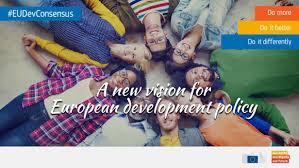
http://data.consilium.europa.eu/doc/document/ST-9459-2017-INIT/en/pdf
The European Consensus on Development, adopted by the European Parliament in Brussels this Thursday, has divided MEPs and raised the heckles of civil society.
The text, which received the green light from EU ministers on 19 May, aims to unite the global Sustainable Development Goals with the EU’s development policy. This vast undertaking has completely redrawn the European development landscape, meeting with serious resistance along the way.
read here more:http://www.euractiv.com/section/development-policy/news/european-parliam...
Read abou the Consensus here: http://www.consilium.europa.eu/en/press/press-releases/2017/05/19-europe...
On 19 May, the Council adopted a new European consensus on development. This joint statement by the three institutions (Parliament, Council and Commission) sets out a new framework for development cooperation for the EU and its member states.
"The new European consensus for development makes the EU even stronger to tackle today's challenges and promote sustainable development and eradication of poverty all over the world. Investing in sustainable development is investing in our common security and prosperity", said Federica Mogherini, EU High Representative for foreign affairs and security policy.
"Today's agreement confirms the commitment of all member states to work together on a shared agenda and priorities for the EU's cooperation with all developing countries over the years to come. We are proud that the Maltese Presidency has succeeded in securing a consensus", added George Vella, Maltese Minister for foreign affairs.
The consensus is important given the crucial role of the EU in the area of development cooperation. The EU remains the world's largest development aid donor, providing more than half of assistance worldwide. The overarching goal is the eradication of poverty, by promoting good governance, human and economic development and tackling universal issues such as fighting hunger and preserving the world's natural resources.
The European consensus for development is the EU's response to the UN 2030 agenda for sustainable development. It sets out the main principles which will guide the approach of the EU and the member states to cooperation with developing countries over the next 15 years, as well as a strategy for reaching the sustainable development goals (SDGs). In line with the global strategy on the EU's foreign and security policy, the consensus will also help achieve the priorities of the EU's external policy.
The consensus is intended to respond to current global challenges which have a demographic, economic, social and environmental impact. Strengthening the resilience of states, societies and individuals is central to this approach. It seeks to bring about sustainable development and to accelerate transformation by placing an emphasis on cross-cutting elements of development policy such as gender equality, youth, investment and trade, sustainable energy and climate action, good governance, democracy, rule of law and human rights, and migration and mobility.
The consensus recommends increased coordination and coherence between the EU and its member states. In order to achieve more effective results and make a greater impact, it proposes a tailored and differentiated approach when working with partners to promote joint programming and implementation, with the full involvement of civil society and other actors. It highlights the importance of development effectiveness, transparency, mutual accountability and ownership by all partners involved, as well as ensuring that all means are used to deliver on the SDGs.










Add new comment